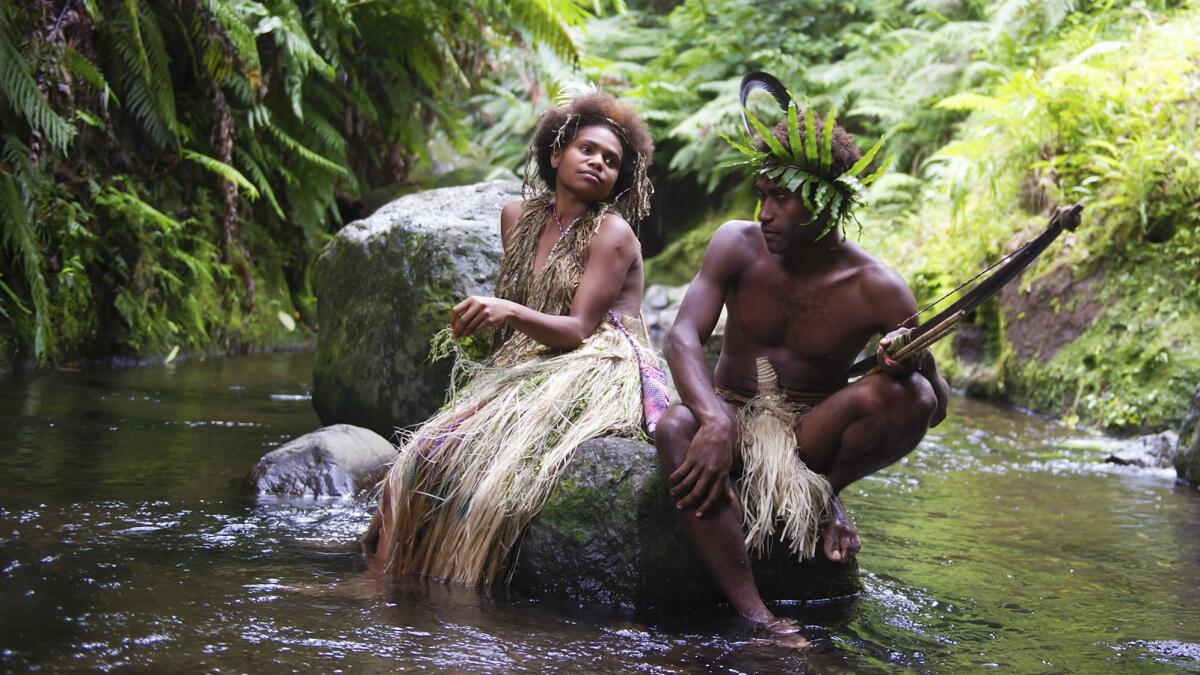Two Oscar-nominated foreign-language films examine cruel times in young lives
Cruel stories of youth tie together a pair of movies nominated for the foreign language Academy Award. The Australian “Tanna,” directed by Bentley Dean and Martin Butler, re-creates the legend of two star-crossed lovers who run afoul of tribal custom on a remote South Pacific island. Denmark’s “Land of Mine,” directed by Martin Zandvliet, exposes the plight of adolescent German prisoners of war forced to clear landmines at the end of World War II. Here’s a look at both films.
“Tanna”
The tiny South Pacific island of Tanna, part of the Republic of Vanuatu, is four hours by plane from Australia. In 2003, Bentley Dean visited to make a television documentary. “It really just captured my imagination,” said Dean, who was taken with the rapturous tropical landscape, which includes an active volcano. “I thought, I’ve got to find an excuse to come back here.”
And so he did. “Tanna,” which Dean co-directed with Martin Butler, is an immersion in the culture and folklore of the Yakel people, who were active collaborators in developing a drama based on real events: a kind of grass-skirted “Romeo and Juliet.”

The filmmakers introduced their intentions by showing the Yakel the 2006 Australian film “Ten Canoes,” a landmark Aboriginal-language production, likewise made with a non-professional, indigenous cast. It was the first film the islanders had ever seen, and it made a solid impression.
“They were keen to start immediately,” Butler said. “They are extremely proud of their culture and happy to expose it to the world.”
The story arose early in Dean’s seven-month stay on the island, at a fiery tribal summit where the right of couples to marry out of love, rather than be bound by the tradition of arranged marriage, was formally recognized.
The new leniency was born of tragedy. Three decades before, two lovers defied the chiefs. “They ran away, were dragged back, and ran away again, and did kill themselves,” said Dean, who doubled as cinematographer in a three-person crew. “No sooner had they died, a shaman received a song, which is in the film. People have been singing that song ever since.”
While most of the cast embraced their roles with gusto, the filmmakers ran into an issue with the couple who play the young lovers. “To express yourself in an amorous way is strictly taboo,” Dean explained, noting a cultural barrier against public displays of affection. The performers, who were not together in real life, were understandably reluctant.
“The chiefs ordered them to do it,” Dean continued. “Then they relaxed and got into the parts so much I was worried there might be an on-set affair.”
“Land of Mine”
Digging into one of the darkest corners of Danish history, writer-director Martin Zandvliet sheds daylight on a tragic episode in the aftermath of World War II.
“I wanted to tell a story that not only didn’t the world know about, but that the Danes didn’t know about,” the Danish filmmaker said. “Land of Mine,” opening in L.A. on Friday, dramatizes the plight of young German prisoners of war, some of them barely teenagers, made to comb the beaches on the west coast of Denmark for thousands of landmines buried there by Nazi troops. “It’s quite crazy no one had taken it up.”
The boys, many of them conscripted near war’s end, lacked the necessary expertise for such hazardous duty. Their task, forced on them in violation of the Geneva Conventions, amounted to a death sentence.
“We like to portray ourselves as a good and healing nation,” said Zandvliet, whose story began to take shape after he examined the gravestones of some of the soldiers. “I was walking around cemeteries, and I found out how young these boys were.”
See the most read stories this hour »
Historical research underpins narrative invention in the film, which boasts an ensemble of new faces and acclaimed Danish actor Roland Møller (“A Hijacking”) as Sgt. Rasmussen, whose cruel and even violent treatment of the boys gradually gives way to compassion.
The location is a beach where such events happened during the war, shot by cinematographer Camilla Hjelm Knudsen, the director’s wife, in stunning natural light, the better to offset the grim consequences at play.
“The day before we started shooting we found a real mine,” Zandvliet said. “So the tension was high when the actors were lying there in the sand with their iron sticks. Is it a real mine or one we put there?”
The filmmaker said he looked to the past to raise an all-too-timely question. “They are building borders everywhere in Europe now,” he said. “Look at the way we treat political refugees, the way people hate in general. Sometimes it’s easy to look at a movie about something that happened 70 years ago. Oops, we did it then. Let’s not do it again … we are doing it again.”
ALSO:
Three categories — foreign, documentary, animated-- to wrap your head around before the Oscars
Can anything beat ‘Toni Erdmann’ or ‘O.J.: Made in America’ in their categories?
Oscar foreign-language shortlist includes ‘Toni Erdmann,’ ‘Land of Mine’ and ‘The Salesman’
More to Read
From the Oscars to the Emmys.
Get the Envelope newsletter for exclusive awards season coverage, behind-the-scenes stories from the Envelope podcast and columnist Glenn Whipp’s must-read analysis.
You may occasionally receive promotional content from the Los Angeles Times.








